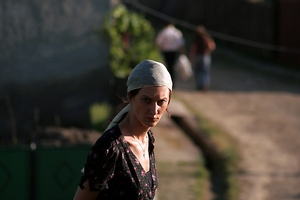Mark:
It would seem unlikely that the people responsible for bringing such wonderfully diverse fare to our screens for the Melbourne International Film Festival would deliberately sabotage one of their choices, but that’s exactly the fate that has befallen the unfortunate Katalin Varga. Rather than being allowed to build to its own – admittedly fairly obvious, but nonetheless intended to be surprising – conclusion, the authors of the festival guide ruin the entire plot in one short sentence.
While picking flowers in a field in her Romanian village, Katalin Varga comes across a little girl who stares briefly at her before rushing off the other way, while later an old man won’t return her greeting on the street. A chance meeting with her best friend and confidant suggests her husband has found out her hidden secret, leading Katalin to a fearful encounter and the end of her life as she knew it.
A chance meeting with her best friend and confidant suggests her husband has found out her hidden secret, leading Katalin to a fearful encounter and the end of her life as she knew it.
Katalin Varga is filmed to be a sparse, ambiguous telling of the titular character’s story – there are long moments spent watching cloud movement or rainfall, while the credit sequences roll without any accompanying soundtrack. It seems that writer/director Peter Strickland wished for very little embellishment, preferring to let the story tell itself. This approach is fine, however it places even more emphasis on the strength of the plot and characters, and in this film contributes to a lack of engagement.
The ‘secret’ of the first act is not revealed until much later in the film, which means Katalin and her son Orbán (Norbert Tankó) spend a large amount of time travelling with the audience having little understanding why. Characters generally are left unexplained and given very little definition. Additionally, Katalin is played as a fairly unsympathetic character by Hilda Péter, contributing further to the lack of immersion in her story. Orbán contributes little to events, while the men Katalin comes across on her journey are a collection of caricatures.
Many of the key sequences are filmed with handheld cameras, in a bizarre choice that ruins most of those same sequences. Why anyone would think filming a scene of vigorous dancing lit only by firelight with a camera seemingly held by another dancer is a good idea is unfathomable, and to let that scene last as long as it does borders on criminal abuse of the vestibular systems of the audience.
The soundtrack is filled with choral pieces presumably intended to add a haunting quality to the events on screen, with mixed results. Often the vocal droning becomes simply annoying, outstaying its welcome and contributing little.
Although Hilda Péter is very good in the lead role, she is surrounded by a film so obscure it becomes vague, and it is extremely difficult to become engaged enough to care about her fate. The film is mercifully brief at just 84 minutes, and yet even this seemed overlong. Disappointing.
Rating: